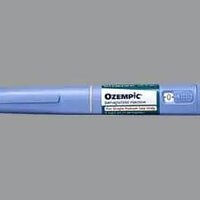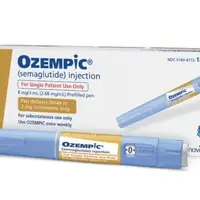Generic name: semaglutide injection
Drug class: Incretin mimetics
Dosage form: subcutaneous injection (0.25mg dose pen; 0.5mg dose pen; 1.0mg dose pen; 2.0 mg dose pen)
Availability: Prescription only
Pregnancy & Lactation: Risk data available
Brand names: Rybelsus, Wegovy, Semaglutide
What is Ozempic?
Ozempic (semaglutide) is used for type 2 diabetes in adults to improve blood sugar levels and also used to lower the risk of major cardiovascular events like stroke, heart attack or death, for adults with type 2 diabetes with heart disease. In clinical trials, Ozempic has also been shown to help with weight loss, after 30 weeks, patients on Ozempic 0.5mg had lost 2.6 kg more than the placebo group, and patients on Ozempic 1mg lost 3.5 kg more than the placebo group. Although currently, Ozempic is not an FDA-approved weight loss medicine.
Ozempic works to lower blood sugar, helping the pancreas make more insulin, decreasing the amount of sugar your liver makes, and slowing the rate food passes through your body, making you feel full longer. Ozempic is from a class of medicines called a glucagon-like peptide-1 (GLP-1) agonists (incretin mimetics) that works by binding to GLP-1 receptors which results in lower blood sugar levels and A1C levels and may also reduce your appetite to help weight loss.
Ozempic is a once-weekly injection that should be used along with diet and exercise. Ozempic should not be used for type 1 diabetes mellitus.
Other brands of semaglutide.
Ozempic (semaglutide) contains the same active ingredient as:
- Wegovy injections which is FDA approved for weight loss in adults and teenagers who have obesity, or adults who are overweight (excess weight) and also have weight-related medical problems.
- Rybelsus tablets which are FDA approved to lower blood sugar levels for type 2 diabetic patients along with diet and exercise.
Related/similar drugs
Mounjaro, metformin, Xarelto, Jardiance, simvastatin, Trulicity, WegovyWarnings
Call your doctor at once if you have signs of a thyroid tumor, such as swelling or a lump in your neck, trouble swallowing, a hoarse voice, or shortness of breath.
You should not use this medicine if you have multiple endocrine neoplasia type 2 (tumors in your glands), or a personal or family history of medullary thyroid cancer.
How should I take Ozempic
Use this medicine exactly as prescribed by your doctor. Follow all directions on your prescription label and read all medication guides or instruction sheets. It is usually started at a low dose that is gradually increased every 4 weeks to 30 days. Follow your doctor's dosing instructions very carefully, and ask your doctor or pharmacist if you need help.
Ozempic is injected under the skin (subcutaneous injection), usually once per week at any time of the day, with or without food. Use an injection on the same day each week.
Prepare an injection only when you are ready to give it. Call your pharmacist if the medicine looks cloudy, has changed colors, or has particles in it.
Your healthcare provider will show you where to inject this medicine, it is usually injected into the abdomen, thigh, or upper arm. Do not inject into the same place two times in a row.
If you choose a different weekly injection day, start your new schedule after at least 2 days have passed since the last injection you gave.
Do not use different brands of semaglutide (Wegovy or Rybelsus) at the same time.
Blood sugar can be affected by stress, illness, surgery, exercise, alcohol use, or skipping meals.
Low blood sugar (hypoglycemia) can make you feel very hungry, dizzy, irritable, or shaky. To quickly treat hypoglycemia, eat or drink hard candy, crackers, raisins, fruit juice, or non-diet soda. Your doctor may prescribe glucagon injection in case of severe hypoglycemia.
Tell your doctor if you have frequent symptoms of high blood sugar (hyperglycemia) such as increased thirst or urination. Ask your doctor before changing your dose or medication schedule.
Your treatment may also include diet, exercise, weight control, medical tests, and special medical care.
You may get dehydrated during prolonged illness. Call your doctor if you are sick with vomiting or diarrhea, or if you eat or drink less than usual.
The Ozempic injection pen contains more than one dose. After your first use, store the pen with the needle removed in a refrigerator or at room temperature. Protect from heat and light. Keep the cap on when not in use. Throw the pen away 56 days after the first use, or if less than 0.25 mg is shown on the dose counter.
Do not reuse a needle. Place it in a puncture-proof "sharps" container and dispose of it following state or local laws. Keep out of the reach of children and pets.
Store unopened injection pens in the original carton in a refrigerator, protected from light. Do not use past the expiration date. Throw away an injection pen that has been frozen.
Dosing information
Ozempic recommended dosage:
- Start Ozempic with a 0.25 mg subcutaneous injection (injection under the skin) once weekly for 4 weeks. The 0.25 mg dosage is intended for treatment initiation and is not effective for glycemic control.
- After 4 weeks on the 0.25 mg dosage, increase the dosage to 0.5 mg once weekly.
- If additional glycemic control is needed after at least 4 weeks on the 0.5 mg dosage, the dosage may be increased to 1 mg once weekly.
- If additional glycemic control is needed after at least 4 weeks on the 1 mg dosage, the dosage may be increased to 2 mg once weekly. The maximum recommended dosage is 2 mg once weekly.
- Administer Ozempic once weekly, on the same day each week, at any time of the day, with or without meals.
- The day of weekly administration can be changed if necessary as long as the time between two doses is at least 2 days (>48 hours).
- If a dose is missed, administer your injection as soon as possible within 5 days after the missed dose. If more than 5 days have passed, skip the missed dose and administer the next dose on the regularly scheduled day. In each case, patients can then resume their regular once weekly dosing schedule
Ozempic is available as 0.25 mg, 0.5 mg, 1mg and 2mg dose pens.
Before Taking
You should not use this medicine if you are allergic to semaglutide or any other ingredients in this medicine, or if you have:
- multiple endocrine neoplasia type 2 (tumors in your glands); or
- a personal or family history of medullary thyroid carcinoma (a type of thyroid cancer).
To make sure this medicine is safe for you, tell your doctor if you have ever had:
- a stomach or intestinal disorder;
- pancreatitis;
- kidney disease; or
- eye problems caused by diabetes (retinopathy).
This medicine caused thyroid tumors or thyroid cancer in animal studies. It is not known whether these effects would occur in people. Ask your doctor about your risk.
Pregnancy
Tell your healthcare professional if you are pregnant or plan to become pregnant. It is not known if Ozempic will harm your unborn baby. Stop using this medicine at least 2 months before you plan to get pregnant. Talk to your healthcare provider about the best way to control your blood sugar if you plan to become pregnant or while you are pregnant. Controlling diabetes is very important during pregnancy, as is gaining the right amount of weight. Even if you are overweight, losing weight during pregnancy could harm the unborn baby.
Breastfeeding
Tell you health care provider if you are breastfeeding or plan to breastfeed. It is not known if Ozempic passes into your breast milk. You should talk with your healthcare provider about the best way to feed your baby while usingthis medicine.
What happens if I miss a dose?
Use Ozempic as soon as you can and then go back to your regular schedule. If you are more than 5 days late for the injection, skip the missed dose and return to your regular schedule.
Hyperglycemia (high blood sugar) may occur if you do not take enough or skip a dose of your antidiabetic medicine, overeat or do not follow your meal plan, have a fever or infection, or do not exercise as much as usual.
- Symptoms of high blood sugar include blurred vision, drowsiness, dry mouth, flushed, dry skin, fruit-like breath odor, increased urination (frequency and amount), ketones in the urine, loss of appetite, stomachache, nausea or vomiting, tiredness, trouble breathing (rapid and deep), unconsciousness, or unusual thirst.
- If symptoms of high blood sugar occur, check your blood sugar level and then call your doctor for instructions.
Do not use two doses of this medicine at one time.
What happens if I overdose?
Seek emergency medical attention or call the Poison Help line at 1-800-222-1222.
Overdose may cause severe nausea, vomiting, or low blood sugar.
What should I avoid while using Ozempic?
Never share an injection pen, even if you changed the needle. Sharing this device can pass infection or disease from person to person.
Ozempic side effects
Common Ozempic side effects
-
low blood sugar (in people with type 2 diabetes);
-
upset stomach, heartburn, burping, gas, bloating;
-
nausea, vomiting, stomach pain, loss of appetite;
-
diarrhea, constipation;
-
runny nose or sore throat;
-
stomach flu symptoms; or
-
headache, dizziness, tiredness.
Serious Ozempic side effects.
Get emergency medical help if you have signs of an allergic reaction: hives, itching; dizziness, fast heartbeats; difficult breathing; swelling of your face, lips, tongue, or throat.
Call your doctor at once if you have:
-
vision changes;
-
unusual mood changes, thoughts about hurting yourself;
-
pounding heartbeats or fluttering in your chest;
-
a light-headed feeling, like you might pass out;
-
signs of a thyroid tumor--swelling or a lump in your neck, trouble swallowing, a hoarse voice, feeling short of breath;
-
symptoms of pancreatitis--severe pain in your upper stomach spreading to your back, nausea with or without vomiting, fast heart rate;
-
gallbladder problems--upper stomach pain, fever, clay-colored stools, jaundice (yellowing of the skin or eyes);
-
low blood sugar--headache, hunger, weakness, sweating, confusion, irritability, dizziness, fast heart rate, or feeling jittery;
-
kidney problems--swelling, urinating less, blood in urine, feeling tired or short of breath; or
-
stomach flu symptoms--stomach cramps, vomiting, loss of appetite, diarrhea (may be watery or bloody).
This is not a complete list of side effects and others may occur. Call your doctor for medical advice about side effects. You may report side effects to FDA at 1-800-FDA-1088.
See more: Ozempic Side EffectsWhat other drugs will affect Ozempic?
This medicine can slow your digestion, and it may take longer for your body to absorb any medicines you take by mouth.
Tell your doctor about all your other medicines, especially insulin or other diabetes medicine, such as dulaglutide, exenatide, liraglutide, Byetta, Trulicity, Victoza, and others.
Other drugs may affect this medicine, including prescription and over-the-counter medicines, vitamins, and herbal products. Tell your doctor about all other medicines you use.






